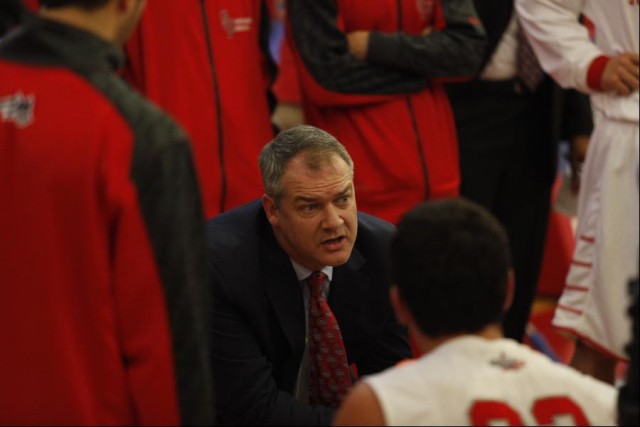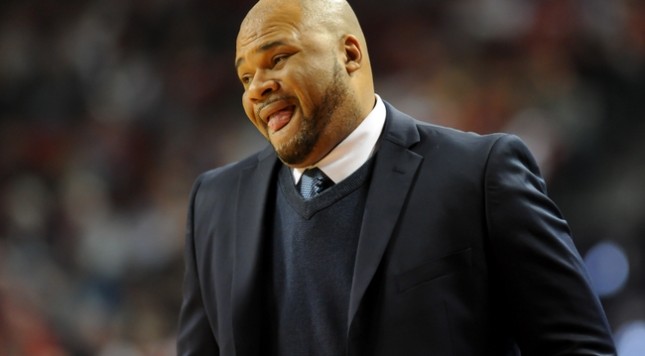It’s one thing to be a coach over 50 years old, without an NCAA tournament appearance at one’s current place of employment.
The career path has been established, an identity formed. It is hard to imagine a different direction after traveling so many miles along a particular road.
Being a younger college basketball coach in search of greatness can, on one hand, feel less threatening. There are a few more tomorrows on the path, and not as many yesterdays. On the other hand, hardships or plot twists in the profession can create the creeping sense of doubt which arrives for just about all of us as human beings: Is THIS the profession I want to practice throughout my life, at least its prime years?
A man named Billy Packer wanted to coach Memphis State in 1970, but Gene Bartow got the job instead and led the Tigers to the Final Four in 1973. Packer, an assistant at Wake Forest, could have stayed on the bench and waited for his big break, but he chose to turn to the business arena and, of course, to broadcasting. In Packer’s case, a long coaching career never quite took flight because of a specific turn in the road.
Sometimes, lives seemingly destined to veer far away from basketball are called back to the game. Consider Colorado head coach and former Kansas star Tad Boyle:
DYK, Tad Boyle was a stock broker for 8 years, got into a car accident, decided to coach? #GoBuffs
— Doug Gottlieb (@GottliebShow) February 25, 2016
Here’s the fuller account of that unexpected journey, courtesy of the Denver Post.
Life in one’s late 30s or early 40s as a not-yet-proven college basketball coach is a tenuous existence. Will these coaches establish themselves and form substantial careers, or will they fail to climb the mountain and burn out, perhaps moving to television or a private camp instructor?
A survey of the Division I coaching roster unearths several coaches who are not yet 50 years old; were hired in 2009 or earlier; and have not made the NCAAs — either at their current stop or at any prior point on their evolving journeys in the profession. Let’s take a brief look at these men, as a way of appreciating the struggle they’ve chosen… and must re-choose every morning they get out of bed.

Zach Spiker could become one of the nation’s more prominent and highly-regarded coaches over the next 15 years or so, but until he breaks through at Army, it might be hard for him to move up the ladder.
Byron Rimm II of Prairie View A&M took over the Panthers in 2006. He’s still there 10 years later, having absorbed a lot of losses. He’s 42 years old. Will he still retain the same passion for his profession in five years?
Tyler Geving is also 42. He was hired at Portland State in 2009 and is still chasing a first Dance invitation. He knows that Weber State, Montana, and Eastern Washington rule the roost in the Big Sky. However, if he can’t roll the boulder over the hill in the next four seasons or thereabouts, will he cede the role of Sisyphus to someone else?
Brian Jones of North Dakota? He’s in his 10th season with the Fighting Hawks, and still doesn’t have an NCAA berth to show for all that labor. At age 44, he can fight more battles, but will that appetite be diminished by more accumulated disappointments?
Eric Reveno of Portland and J.P Piper of Nicholls State are in very uncomfortable positions. They will both turn 50 very soon. At 49, they have to be wondering if their moment of triumph will ever come.
At the other end of the spectrum relative to Reveno and Piper, Zach Spiker of Army isn’t even 40 years old. Yet, he’s been on the job in West Point since 2009. He’s trying to remove Army from the list of five schools that are 0-for-77 in terms of making the NCAA tournament. (A total of 45 other schools have never made it, but Army is one of only five that were eligible for every Dance, dating back to the first one in 1939.) If he busts through that barrier, his ticket to a big job will be written. However, as long as the Black Knights can’t get over the hump, it’s possible that the same thing could be said for Spiker’s career… if indeed he wants to move up the ranks in due time.

Unless you live in Albany or another America East locale, Steve Pikiell is a coach you should root for in the coming weeks.
Steve Pikiell is the coach every non-Albany (or non-America East) fan should root for in the coming weeks. At 48, Pikiell has never made the NCAAs. Neither has his school, Stony Brook. The Seawolves, however, will be the top seed in the America East Tournament and host a potential title game, most likely against Albany. Pikiell could remove himself from this list of younger coaches with extended tenures at current programs (Pikiell came to Stony Brook in 2005) who have never broken through.
Rex Walters was a fine player at the University of Kansas. He has coached at the University of San Francisco since 2008, but the Gonzaga-Saint Mary’s-BYU triumvirate has kept him (and Reveno of Portland) out of Bracketville. San Francisco has lost enough West Coast Conference Tournament semifinals and quarterfinals to last a lifetime. Walters’s patience is routinely tested — here’s hoping he’ll cross the threshold before too long.
There’s yet another West Coast Conference coach in the same boat as Walters and Reveno. What those two men have experienced in San Francisco and Portland, 44-year-old Kerry Keating has faced at Santa Clara. As the alumnus of a Jesuit school in the West (Seattle University), I can say that these campuses are beautiful places in which to work. Nevertheless, if coaching — and more specifically, succeeding in coaching — is enough of a priority, it’s hard to escape the idea that with the Zags, Saint Mary’s, and BYU all in the neighborhood, it’s extremely difficult to arrive at the Dance hall from the lower or middle tiers of the WCC.
*
College basketball coaching is not for the faint of heart, but it’s good to know that at lower- or middle-tier programs removed from the cutthroat world of the Power 5 conferences, coaches can be given extended time in which to establish an identity and chase their dreams. The dream is still relatively young for the coaches we’ve introduced to you in this piece.
One can only wonder if — or when — the dream will no longer seem as attractive, as realistic, or both.

